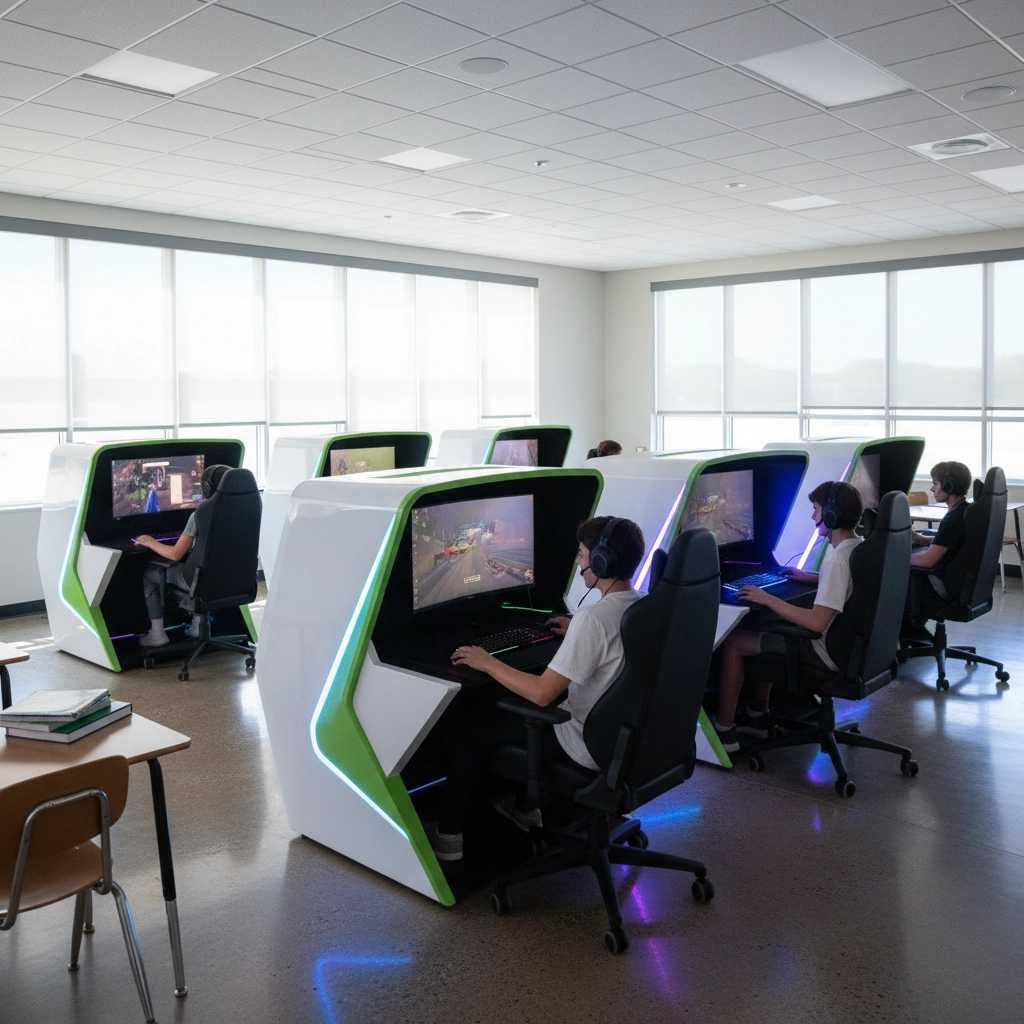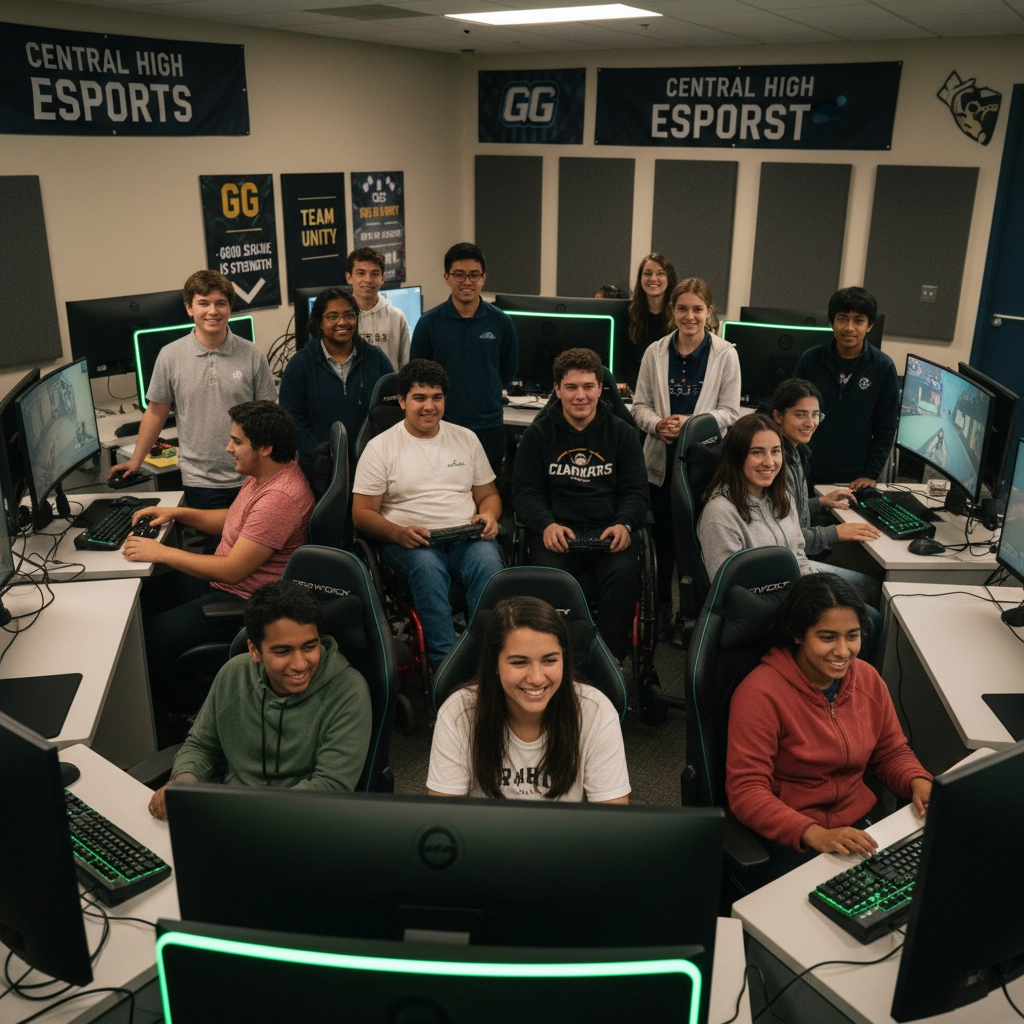Educational institutions across the United States are implementing esports pods as a strategic approach to enhance student learning outcomes and strengthen school community engagement. These specialized gaming stations represent a structured integration of competitive gaming into educational environments, providing measurable benefits for academic performance and social development.
Understanding Esports Pods Infrastructure
Esports pods consist of standardized gaming stations designed specifically for educational settings. Each pod contains a complete computer system, wireless mouse and keyboard, gaming console, high-speed internet connectivity, and built-in recording cameras. The standardized equipment configuration ensures equitable access for all students regardless of economic background or home gaming capabilities.
The infrastructure includes 110V power connections, Wi-Fi network integration, and professional-grade recording equipment. This setup enables students to document gaming sessions, analyze performance metrics, and share content for educational purposes. The standardized nature of pod equipment eliminates performance disparities based on hardware access, creating merit-based competitive environments.

Sports Media, Inc. manufactures these pods with specific educational applications in mind. The design incorporates durability standards for high-usage educational environments and compatibility with existing school technology infrastructure. Installation requires minimal facility modification while providing maximum educational utility.
Academic Learning Enhancement
Esports integration through pod systems demonstrates measurable improvements in critical thinking and problem-solving capabilities. Students engaging with strategy-based games develop analytical skills applicable to STEM subjects, mathematics, and logical reasoning tasks. The real-time decision-making requirements in competitive gaming environments translate directly to enhanced cognitive processing abilities.
Mathematical concepts become practically applicable through gaming scenarios. Probability calculations, statistical analysis, geometric positioning, and strategic planning occur naturally within game contexts. Students demonstrate improved comprehension of abstract mathematical principles when experienced through interactive gaming applications.
STEM engagement increases significantly among students participating in esports pod programs. Game mechanics often require technical understanding, encouraging exploration of programming, engineering, and technology concepts. Students report increased interest in computer science, mathematics, and engineering career paths following esports program participation.
The hands-on learning approach provided by esports pods addresses diverse learning styles effectively. Visual learners benefit from graphical interfaces, kinesthetic learners engage through interactive controls, and auditory learners process information through game audio and team communication requirements.
Behavioral and Social Development
Students experiencing behavioral challenges in traditional classroom settings often demonstrate improved self-regulation within structured esports environments. The goal-oriented nature of competitive gaming provides clear behavioral expectations and immediate feedback mechanisms. Students develop patience, persistence, and emotional regulation through repeated gameplay experiences.

Inclusive participation opportunities distinguish esports from traditional athletics. Physical limitations, gender, and socioeconomic factors present minimal barriers to esports participation. This inclusivity enables broader student engagement and community building across diverse student populations.
Social anxiety and isolation issues decrease among students participating in esports pod programs. The shared interest in gaming provides natural conversation topics and relationship-building opportunities. Students develop communication skills through team-based gaming requirements and collaborative problem-solving activities.
Leadership development occurs organically within esports team structures. Students assume captain roles, strategic planning responsibilities, and mentorship positions with newer participants. These leadership experiences transfer to academic group projects and other school activities.
Community Building Impact
Team-based gaming requires consistent communication, collaboration, and mutual support among participants. Students develop interpersonal skills through coordinated gameplay, strategic discussion, and conflict resolution within competitive contexts. These collaborative experiences strengthen peer relationships and create supportive social networks.
School attendance rates improve among students participating in esports programs. The scheduled practice times and tournament commitments create additional connection points to school communities. Students demonstrate increased investment in overall school success when engaged through esports participation.
Cross-grade interaction increases through mixed-age esports teams and mentorship programs. Older students provide guidance and skill development support for newer participants. This peer mentoring system strengthens overall school community connections and reduces grade-level social barriers.
Parent and family engagement expands through esports program involvement. Gaming provides shared interests between students and family members, creating additional communication opportunities. School-sponsored tournaments and events increase family participation in school activities.
Measurable Academic Outcomes
Schools implementing esports pod programs report higher grade point averages among participating students compared to non-participants. The structured nature of esports programs encourages academic accountability, as grade requirements typically determine participation eligibility.

Student retention rates increase in educational institutions offering structured esports programs. The additional connection point to school communities reduces dropout rates and increases graduation completion percentages. Students cite esports programs as significant factors in their decisions to remain enrolled in educational programs.
College scholarship opportunities expand through esports participation. Over 200 colleges currently offer esports scholarships ranging from $500 to $8,000 annually, with increasing numbers providing full-tuition awards. These scholarship pathways create tangible educational advancement opportunities for participating students.
Career pathway development occurs through technical skills acquired during esports participation. Students gain experience in streaming, broadcasting, content creation, and tournament organization. These skills align with growing digital media and technology industry employment opportunities.
Professional Skill Development
Technical competencies develop naturally through esports pod utilization. Students learn video editing, live streaming, social media management, and digital content creation. These skills provide direct preparation for media, technology, and communications career paths.
Project management abilities emerge through tournament organization, team coordination, and event planning activities. Students develop timeline management, resource allocation, and leadership capabilities applicable across multiple professional contexts.
Communication skills improve through team-based gameplay, tournament commentary, and peer instruction activities. Students practice public speaking, written communication, and interpersonal interaction in low-pressure environments that build confidence for academic and professional situations.
Implementation Considerations
Successful esports pod implementation requires administrative support, adequate facility space, and reliable internet infrastructure. Schools must establish clear participation guidelines, academic eligibility requirements, and behavioral expectations for program participants.
Staff training ensures effective program management and student supervision. Educators require familiarity with gaming platforms, tournament structures, and student development approaches specific to esports environments.
Budget considerations include initial equipment costs, ongoing maintenance requirements, and potential facility modifications. However, the educational benefits and student engagement outcomes justify these investments through improved academic performance and increased student retention.
Community partnerships with local businesses, gaming organizations, and higher education institutions enhance program sustainability and expansion opportunities. These relationships provide additional resources, expertise, and advancement pathways for participating students.
The integration of esports pods in educational settings represents a data-driven approach to improving student outcomes through technology-enhanced learning environments. The measurable benefits in academic performance, social development, and community engagement demonstrate the educational value of structured gaming programs in contemporary educational contexts.
